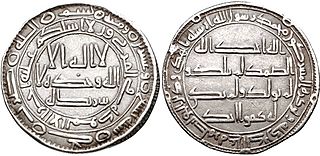Alid revolt can refer to any rebellion by Alid partisans against the Umayyad and Abbasid caliphates:
- Alid revolts during the Second Fitna, against the Umayyads, suppressed in the Battle of 'Ayn al-Warda and the Battle of Harura
- Zaydi revolt of 740 in Kufa, against the Umayyads
- Alid revolt of 762–763 in Medina and Basra, against the Abbasids
- Alid revolt of 786 in Mecca, against the Abbasids, suppressed in the Battle of Fakhkh

The Second Fitna or the Second Islamic Civil War was a period of general political and military disorder and conflicts that afflicted the Islamic community during the early Umayyad caliphate. It followed the death of the first Umayyad caliph Muawiyah I in 680 and lasted for about twelve years. The war involved the suppression of two challenges to the Umayyad dynasty, the first by Husayn ibn Ali, as well as his supporters including Sulayman ibn Surad and Mukhtar al-Thaqafi who rallied for his revenge in Iraq and the second by Abd Allah ibn al-Zubayr.

The Battle of Harura took place in late 686 near Kufa, Iraq. It was fought between the forces of Mus'ab ibn al-Zubayr, the governor of Basra on behalf of his brother Caliph Abd Allah ibn al-Zubayr, and al-Mukhtar al-Thaqafi, the ruler of Kufa. It ended with the latter's decisive defeat and the slaying of most of his commanders. In the immediate aftermath, Mus'ab besieged and killed al-Mukhtar in Kufa, sanctioned the killing of thousands of his sympathizers in the city and annexed Kufa and its dependencies, i.e. the Sawad and Jibal. Ibrahim ibn al-Ashtar, al-Mukhtar's governor over Mosul and its dependencies, i.e. the Jazira, Adharbayjan and Arminiya, afterward defected to Mus'ab. Thus, all of Iraq came under Zubayrid authority as a result of Mus'ab's victory.
The Alid revolt of 762–763 or Revolt of Muhammad the Pure Soul was an uprising by the Hasanid branch of the Alids against the newly established Abbasid Caliphate. The Hasanids, led by the brothers Muhammad and Ibrahim, rejected the legitimacy of the Abbasid family's claim to power. Reacting to mounting persecution by the Abbasid regime, in 762 they launched a rebellion, with Muhammad rising in revolt at Medina in September and Ibrahim following in Basra in November. The lack of co-ordination and organization, as well as the lukewarm support of their followers, allowed the Abbasids under Caliph al-Mansur to react swiftly. The Caliph contained Muhammad's rebellion in the Hejaz and crushed it only two weeks after Ibrahim's uprising, before turning his forces against the latter. Ibrahim's rebellion had achieved some initial successes in southern Iraq, but his camp was riven by dissent among rival Shi'a groups as to the prosecution of the war and future political objectives. In the end, Ibrahim's army was decisively defeated at Bakhamra in January 763, with Ibrahim dying of his wounds shortly after. The failure of the rebellion did not mark the end of Alid unrest, but it consolidated the power of the Abbasid dynasty.





